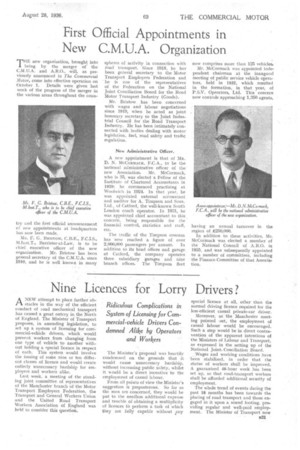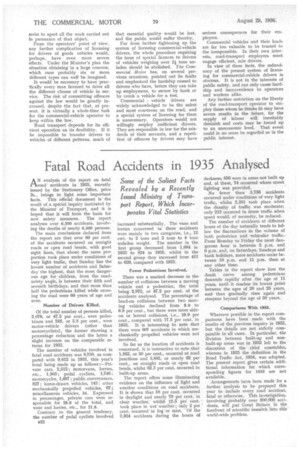Nine Licences for• Lorry Drivers?
Page 31

Page 32

If you've noticed an error in this article please click here to report it so we can fix it.
A NEW attempt to place further ob
stacles in the way of the efficient conduct of load mechanical transport has caused a great outcry in the North of England. The Minister of Transport proposes, in amending legislation, to set up a system of licensing for commercial-vehicle drivers, which would prevent workers from changing from one type of vehicle to another without holding a special licence in respect of each. This system would involve the issuing of some nine or ten different classes of licence and would create entirely unnecessary hardship for employers and workers alike.
Last week, a meeting of the standing joint committee of representatives of the Manchester branch of the Motor Transport Employers Federation, the Transport and General Workers Union and the United Road Transport Workers Association of England was held to consider this question.
-The Minister's proposal was heartily condemned on the grounds that it would cause unnecessary hardship, without increasing public safety, whilst it would be a direct incentive to the employment of casual labour.
From all points of view the Minister's suggestion is preposterous. So far as the men are concerned, they would be put to the needless additional expense and trouble of obtaining a multiplicity of licences to perform a task of which they are fully capable without any special licence at all, other than the normal driving licence required for the less-efficient casual private-car driver.
Moreover, as the Manchester meeting pointed :mit, the employment of casual labour would be encouraged. Such a step would be in direct contravention of the apparent intentions of the Ministers of Labour and Transport, as expressed in the setting up of the National Joint. Conciliation Board.
• Wages and working conditions have been stabilized, in order that the status of workers shall be improved. A guaranteed 48-hour week has been set up, so that road-transport workers shall be afforded additional security of employment.
• The whole trend of events during the past 18 months has been towards the placing of road transport and those engaged in it upon a sound footing, providing regular and well-paid employment. The Minister of Transport now
seeks to upset all the work carried out in pursuance of that object.
From the operators' point of view, any further complication of licensing for drivers of goods vehicles would, perhaps, have even more severe effects. Under the Minister's plan the situation obtaining in a large concern, which runs probably six or more different types can well be imagined.
It would be necessary to have practically every man licensed to drive all the different classes of vehicle in service. The risk of committing offences against the law would be greatly increased, despite the fact that, at present, it is virtually a whole-time task for the commercial-vehicle operator to keep within the law.
Road transport depends for its efficient operation on its flexibility. If it be impossible to transfer drivers to vehicles of different patterns, much of that essential quality would be lost, and the public would suffer thereby.
Far from further tightening up the system of licensing commercial-vehicle drivers, the whole procedure requiring the issue of special licences to drivers of vehicles weighing over 21 tons unladen should be abolished. The Commercial Motor has, on several previous occasions, pointed out its faults and emphasized the hardship caused to drivers who have, before they can take up employment, to secure by hook or by crook a vehicle for a test.
Commercial vehicle drivers are widely acknowledged to be the safest and most courteous on the road, and a special system of licensing for them is unnecessary. Operators would not willingly employ inefficient drivers. They are responsible in law for the misdeeds of their servants, and a repetition of offences by drivers may have
serious consequences for their employers.
Commercial vehicles and their loads are far too valuable to be trusted to the irresponsible. In their own interests, road-transport employers must engage efficient, safe drivers.
In view of these facts, the redundancy of the present system of licensing for commercial-vehicle drivers is obvious. It is not in the interests of public safety, and can only cause hardship and inconvenience to operators and workers alike.
Any further restriction on the liberty of the road-transport operator to employ those whom he thinks fit may have severe results in the future, for the supply of labour will inevitably diminish and costs may be forced up to an uneconomic level. That event could in no sense be regarded as in the public interest.




















































































